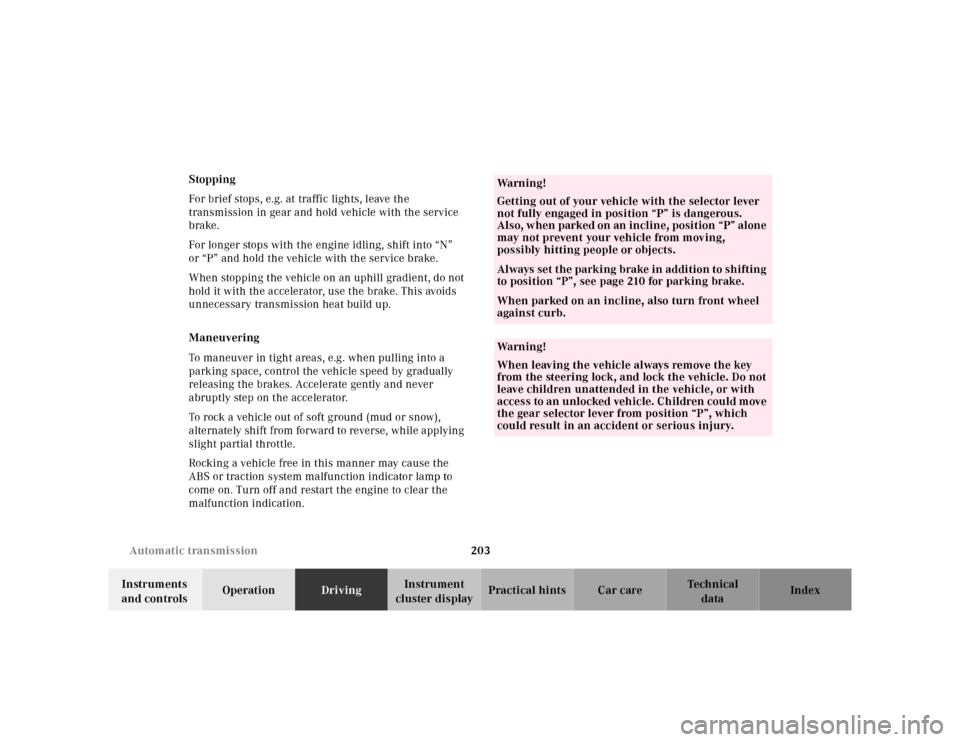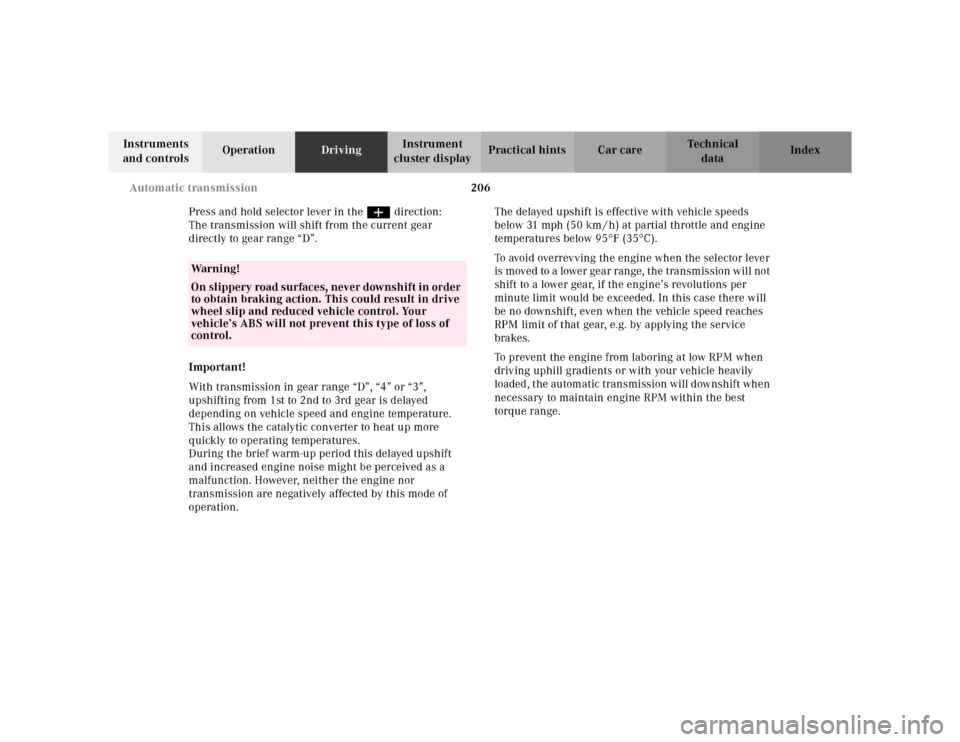2001 MERCEDES-BENZ E-Class WAGON ABS
[x] Cancel search: ABSPage 6 of 345

3 Contents
DrivingControl and operation of radio
transmitters ............................... 184
The first 1 000 miles
(1 500 km) ................................. 185
Maintenance ................................... 185
Tele Aid............................................ 186
Catalytic converter......................... 196
Emission control ............................ 197
Steering lock ................................... 198
Starting and turning off
the engine .................................. 200
Automatic transmission................ 201
Parking brake ................................. 210
Driving instructions ...................... 211
Drive sensibly -
Save Fuel ..................................... 211
Drinking and Driving ................ 211
Pedals ........................................... 211
Power assistance ........................ 212
Brakes .......................................... 212
Driving off ................................... 213
Parking ........................................ 213Tires ..............................................214
Snow chains ................................ 216
Winter driving instructions ......217
Block heater .................................218
Deep water ...................................219
Passenger compartment ............219
Traveling abroad ......................... 219
Cruise control ................................ 220
Brake assist system
(BAS)........................................... 223
Antilock brake system
(ABS) .......................................... 225
Four wheel electronic
traction system (4MATIC) ....... 227
Electronic stability program
(ESP) ........................................... 228
Parking assist (Parktronic) .......... 232
What you should know
at the gas station ...................... 237
Check regularly and before
a long trip .................................. 239
Instrument cluster displayMalfunction and indicator
lamps in the
instrument cluster .................... 242
On-board
diagnostic system .......................242
Check engine malfunction
indicator lamp .............................242
Brake warning lamp ..................243
Supplemental restraint
system (SRS)
indicator lamp .............................244
Fuel reserve and fuel cap
placement warning ....................244
Electronic stability program
(ESP) — warning lamp ...............245
BAS / ESP malfunction
indicator lamp .............................245
ABS malfunction
indicator lamp .............................245
Seat belt warning lamp .............246
Malfunction and indicator
lamp in the center console ...... 246
Page 7 of 345

4 Contents
AIRBAG OFF
indicator lamp .............................246
Malfunction and warning
messages in the
multifunction display ............... 247
DISPLAY DEFECTIVE ................248
BATTERY / ALTERNATOR .........249
ABS-SYSTEM ...............................250
BRAKE ASSIST ...........................250
BRAKE LINING WEAR .............. 251
BRAKE FLUID ............................. 251
PARKING BRAKE .......................252
ENGINE FAN ...............................252
COOLANT (coolant level) ..........253
COOLANT TEMP. (coolant
temperature) ...............................254
LIGHTING SYSTEM ....................255
LIGHT SENSOR ...........................256
REMOVE KEY .............................256
TELE AID .....................................257
STEERING GEAR OIL .................257
ENGINE OIL LEVEL ...................258
WASHER FLUID ..........................259ELEC. STABIL. PROG.
(Electronic stability program) . 260
Practical hintsFirst aid kit ..................................... 262
Fuses ............................................... 263
Electrical outlet.............................. 265
Hood ................................................ 266
Checking engine oil level............. 268
Automatic transmission
fluid level ................................... 269
Coolant level................................... 269
Adding coolant ........................... 270
Windshield and headlamp
washer system .......................... 271
Windshield and headlamp
washer fluid mixing ratio .........271
Spare wheel, vehicle tools............ 272
Vehicle jack .................................... 273
Wheels ............................................ 274
Tire replacement ........................274
Rotating wheels ......................... 275
Spare wheel..................................... 276
Spare wheel bolts .......................276Changing wheels ........................... 277
Tire inflation pressure .................. 282
Battery ............................................. 283
Jump starting .................................. 285
Towing the vehicle ......................... 288
Transmission selector lever,
manually unlocking .................. 290
Exterior lamps ................................ 291
Headlamp assembly ...................292
Taillamp assemblies ..................295
Changing batteries in the
electronic main key .................. 298
Synchronizing
remote control ............................300
Emergency engine
shut-down................................... 300
Emergency operation of
sliding / pop-up roof ................. 301
Manual release for
fuel filler flap ............................. 302
Replacing wiper blade insert ....... 302
Roof rack ......................................... 305
Page 27 of 345

24 Central locking system
Te ch n ica l
data Instruments
and controlsOperationDrivingInstrument
cluster displayPractical hints Car care Index
Ve h i c l e k ey s
Included with your vehicle are:
•2 electronic main keys with integrated radio
frequency and infrared remote controls plus
removable mechanical key.
•1 electronic reserve key without remote control
functions, plus removable mechanical key.
The locking tabs for the mechanical key portion of the
two electronic main keys are a different color to help
distinguish it.
Wa r n i n g !
When leaving the vehicle always remove the
electronic key from the steering lock, and lock your
vehicle. Do not leave children unattended in the
vehicle, or with access to an unlocked vehicle.
Unsupervised use of vehicle equipment may cause
serious personal injury.
Page 91 of 345

88 Instrument cluster
Te ch n ica l
data Instruments
and controlsOperationDrivingInstrument
cluster displayPractical hints Car care Index
Indicator lamps in the instrument cluster
High beam
ABS malfunction, see page 245
Brake fluid low (except Canada).
Parking brake engaged, see page 243
Brake fluid low (Canada only).
Parking brake engaged, see page 243
BAS malfunction, see page 245
ESP malfunction, see page 245
Fasten seat belts, see page 246
ESP. Adjust driving to road condition,
see page 245Engine malfunction indicator lamp. If the
“CHECK ENGINE” malfunction indicator
lamp comes on when the engine is running,
it indicates a malfunction of the fuel
management system, emission control
system, systems which impact emissions, or
the fuel cap is not closed tight. In all cases,
we recommend that you have the
malfunction checked as soon as possible,
see page 242
SRS malfunction, see page 244
Function indicator lamp on the center console
Front passenger airbag automatically
switched off, see page 246
ABSBRAKE
CHECK
ENGINESRS
Page 186 of 345

183 Contents - Driving
Te ch n ica l
data Instruments
and controlsOperationDrivingInstrument
cluster displayPractical hints Car care Index
DrivingControl and operation of radio
transmitters ............................... 184
The first 1 000 miles
(1 500 km) ................................. 185
Maintenance ................................... 185
Tele Aid............................................ 186
Catalytic converter......................... 196
Emission control ............................ 197
Steering lock ................................... 198
Starting and turning off
the engine .................................. 200
Automatic transmission................ 201
Parking brake ................................. 210Driving instructions....................... 211
Drive sensibly -
Save Fuel ...................................... 211
Drinking and Driving ................ 211
Pedals ........................................... 211
Power assistance .........................212
Brakes ...........................................212
Driving off ....................................213
Parking .........................................213
Tires ..............................................214
Snow chains ................................ 216
Winter driving instructions ......217
Block heater .................................218
Deep water ...................................219
Passenger compartment ............219
Traveling abroad ......................... 219Cruise control ................................. 220
Brake assist system
(BAS) ........................................... 223
Antilock brake system
(ABS) ........................................... 225
Four wheel electronic
traction system
(4MATIC) .................................... 227
Electronic stability
program
(ESP) ........................................... 228
Parking assist (Parktronic) .......... 232
What you should know
at the gas station ....................... 237
Check regularly and
before a long trip....................... 239
Page 206 of 345

203 Automatic transmission
Te ch n ica l
data Instruments
and controlsOperationDrivingInstrument
cluster displayPractical hints Car care Index Stopping
For brief stops, e.g. at traffic lights, leave the
transmission in gear and hold vehicle with the service
brake.
For longer stops with the engine idling, shift into “N”
or “P” and hold the vehicle with the service brake.
When stopping the vehicle on an uphill gradient, do not
hold it with the accelerator, use the brake. This avoids
unnecessary transmission heat build up.
Maneuvering
To maneuver in tight areas, e.g. when pulling into a
parking space, control the vehicle speed by gradually
releasing the brakes. Accelerate gently and never
abruptly step on the accelerator.
To rock a vehicle out of soft ground (mud or snow),
alternately shift from forward to reverse, while applying
slight partial throttle.
Rocking a vehicle free in this manner may cause the
ABS or traction system malfunction indicator lamp to
come on. Turn off and restart the engine to clear the
malfunction indication.
Wa r n i n g !
Getting out of your vehicle with the selector lever
not fully engaged in position “P” is dangerous.
Also, when parked on an incline, position “P” alone
may not prevent your vehicle from moving,
possibly hitting people or objects.Always set the parking brake in addition to shifting
to position “P”, see page 210 for parking brake. When parked on an incline, also turn front wheel
against curb.Wa r n i n g !
When leaving the vehicle always remove the key
from the steering lock, and lock the vehicle. Do not
leave children unattended in the vehicle, or with
access to an unlocked vehicle. Children could move
the gear selector lever from position “P”, which
could result in an accident or serious injury.
Page 209 of 345

206 Automatic transmission
Te ch n ica l
data Instruments
and controlsOperationDrivingInstrument
cluster displayPractical hints Car care Index
Press and hold selector lever in the æ direction:
The transmission will shift from the current gear
directly to gear range “D”.
Important!
With transmission in gear range “D”, “4” or “3”,
upshifting from 1st to 2nd to 3rd gear is delayed
depending on vehicle speed and engine temperature.
This allows the catalytic converter to heat up more
q uickly to operating temperatures.
During the brief warm-up period this delayed upshift
and increased engine noise might be perceived as a
malfunction. However, neither the engine nor
transmission are negatively affected by this mode of
operation.The delayed upshift is effective with vehicle speeds
below 31 mph (50 km / h) at partial throttle and engine
temperatures below 95°F (35°C).
To avoid overrevving the engine when the selector lever
is moved to a lower gear range, the transmission will not
shift to a lower gear, if the engine’s revolutions per
minute limit would be exceeded. In this case there will
be no downshift, even when the vehicle speed reaches
RPM limit of that gear, e.g. by applying the service
brakes.
To prevent the engine from laboring at low RPM when
driving uphill gradients or with your vehicle heavily
loaded, the automatic transmission will downshift when
necessary to maintain engine RPM within the best
torque range.
Wa r n i n g !
On slippery road surfaces, never downshift in order
to obtain braking action. This could result in drive
wheel slip and reduced vehicle control. Your
vehicle’s ABS will not prevent this type of loss of
control.
Page 221 of 345

218 Driving instructions
Te ch n ica l
data Instruments
and controlsOperationDrivingInstrument
cluster displayPractical hints Car care Index
Winter driving
Have your vehicle winterized at your authorized
Mercedes-Benz Center before the onset of winter.
•Change the engine oil if the engine contains an oil
which is not approved for winter operation. For
viscosity (SAE / CCMC class) and filling quantity,
see page 322.
•Check engine coolant anticorrosion / antifreeze
concentration.
•Additive for the windshield washer and headlamp
cleaning system: Add MB Concentrate “S” to a
premixed windshield washer solvent / antifreeze
which is formulated for below freezing
temperatures, see page 271.
•Test battery: Battery capacity drops with decreasing
ambient temperature. A well charged battery helps
to ensure that the engine can be started, even at low
ambient temperatures.•Tires: We recommend M+S rated radial-ply tires on
all four wheels for the winter season. Observe
permissible maximum speed for M+S rated
radial-ply tires and the legal speed limit.
Note:
In winter operation, the maximum effectiveness of the
antilock brake system (ABS) or electronic stability
program (ESP) can only be achieved with M+S rated
radial-ply tires and / or snow chains recommended by
Mercedes-Benz. Snow chains maximize performance.
Block heater (for Canada only)
The engine is equipped with a block heater.
The electrical cable may be installed at your authorized
Mercedes-Benz Center.